-
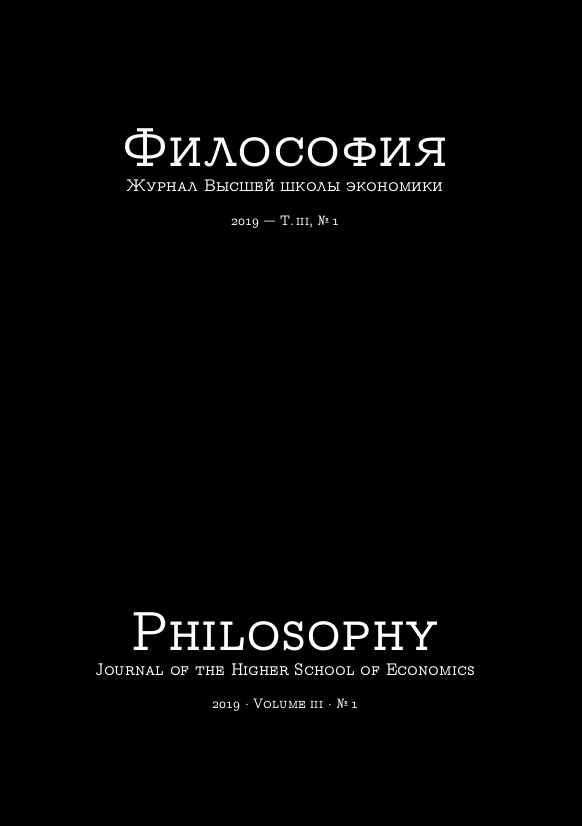 Knowing the Unknowable
Vol 3 No 1 (2019)
Knowing the Unknowable
Vol 3 No 1 (2019)Philosophical search presupposes not only the constant expansion of the frontiers of knowledge but also an attempt to go beyond these boundaries, the effort of knowing the unknowable. An equally important task is to find an adequate language to express the inexpressible. Antiquity offers different strategies for philosophical work with the sacred and transcendent. This volume of Philosophy. Journal of the Higher School of Economics presents some of these strategies.
The Euthyphro, a dialogue from the Corpus Platonicum, is an example of such an attempt to give a strict philosophical definition of the concept of piety. Yuriy Shichalin (Museum Graeco-Latinum, Moscow) argues in his article “Notes on the Euthyphro from the Corpus Platonicum” that the notion of ‘pious’ was discussed in the Academy as the background for creating late Plato’s dialogue Laws. Thus, the Euthyphro reflects the critical consideration of various definitions of the concept. As noticed by Yuriy Shichalin, Xenocrates devoted the special treatise to the problem of piety, and he can be a person hidden behind the figure of the prophet
Euthyphro.Philo of Alexandria forms the roots of what may be called the dialectic of apophatic theology in patristic thought. As Ilaria Ramelli (Catholic University; Angelicum; Oxford University) shows, Philo develops a ‘strategy of differentiation’ of the God’s unknowable ousia (essence) and God’s knowable dynameis (powers). For Philo, these powers are associated with the concept of the divine Logos, which he understands as “intelligible world” in the spirit of the middle Platonism.
The article by Georgiana Huian (The University of Bern) is devoted to what can be called ‘negative theology’ in Plotinus. She argues that the transcendental nature of the One, its absolute otherness, requires a specific language for describing it. The Enneads reflect the search for this language, and Plotinus gives philosophical justification for the constant usage of negations. Thus, the via negativa leaves a gap, in which the Inexpressible can receive names or implicit descriptions.
Anna Grünert (St. Tikhon’s Orthodox University, Moscow) continues the discussion of knowing the unknowable. She considers particular cases when Basil of Caesarea uses the vision-related vocabulary. Analyzing the Hexaemeron, Anna Grünert concludes that the concept of contemplation plays a crucial role in the natural theology underlying Basil’s pedagogy in this text. She also notes the influence of Philo of Alexandria on Basil’s attitude on the “best human sense.”
An article by Mariya Varlamova (The Saint Petersburg State University of Aerospace Instrumentation, Saint Petersburg) is devoted to the dispute on the prime matter between John Philoponus and Simplicius. Philoponus denies the existence of unlimited matter and insists that the first substrate of physical bodies must be either a three-dimensional extension or body as such. By endowing matter with its own logos, Philoponus considers it not as pure potentiality, known only by analogy, but as an entity that exists as something, although not separately.
In the Translations and Critical Editions the reader will find new translations of Aurelius Augustinus’ Epistola 166 by Polina Semenova (the University of Cologne), Basil’s of Caesarea First Homily of Hexaemeron by Olga Alieva (HSE, Moscow), and Galen’s Exercise with a Small Ball by Irina Prolygina (A. I. Yevdokimov State University of Medicine and Dentistry, Moscow).
Finally, Philosophical Criticism contains reviews on the new translations of Plato and Origen, as well as on some latest philosophical books.
Olga Alieva and Alexey Pleshkov
-
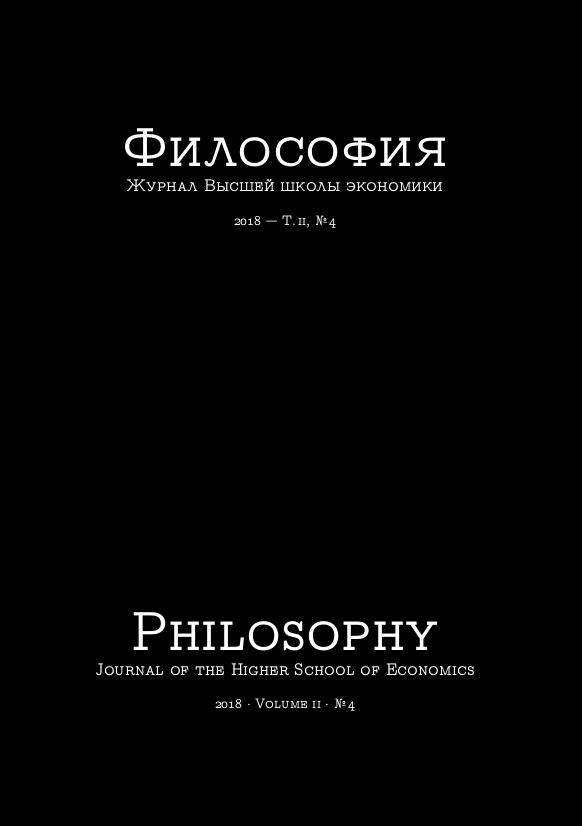 Consciousness and Symbol
Vol 2 No 4 (2018)
Consciousness and Symbol
Vol 2 No 4 (2018)The issue brought to your attention is not typical. It stands out from the familiar landscape of contemporary philosophical discussions, where oases of genuine thoughts are situated in the midst of deserts of meaningless reviews, and the flowering valleys of respectable schools are separated by the mountain ranges of conceptual and methodological incommensurability. The authors of this issue speak different philosophical languages and use different conceptual optics. However, what unites them is that they are trying to return personal depth to philosophical questioning and dare to re-ask questions that seem to have ready answers.
The main theme of the issue clearly refers to the book by Merab Mamardashvili and Alexander Pyatigorsky Symbol and Consciousness: Metaphysical Arguments about Consciousness, Symbolism and Language. What can be said about the consciousness and symbol from the standpoints of modern phenomenology, analytic philosophy, transcendentalism, and metaphysical realism? From what evidence do they emanate, what intuitions underlie their traditions? Where are those borders, on the approaches to which our intuitions fall silent, and the evidence is misleading?
In Viktoriya Faybyshenko’s paper, the motive of “birth” as a constitutive human ability, a free phenomenon, the cause of itself (according to Mamardashvili’s phenomenological project) is investigated at length. In response to the problem of combining the fundamental tautology of the act of consciousness and the need for an individual, irreplaceable event of human thought, the paper provides an original interpretation of the transcendental act, occurring in “unpredictable concreteness here-and-now” and giving a place for “birth itself” to be born.
Whereas for Mamardashvili, an event of thought is a realization of a symbol, and at the same time a kind of “empty” transcendental symbol, for Kantor and Florensky, as Tatyana Levina shows in her paper, the symbol turns out to be something greater. Comparing the metaphysical and epistemological aspects of this concept (the most important link in both cases is the idea of infinity), she shows the existence of unexpected interrelations between analytic philosophy and Russian religious thought of the late 19th – early 20thcenturies, as well as the deep immersion of both currents in the general context of European philosophy, as it developed from Augustine and Nicholas of Cusa to Kant and Leibniz.
A peculiar counterpoint to the topic of birth is the phenomenology of death, analyzed by Ilya Pavlov in his paper. The author shows the transformation of Heideggerian death phenomenology within the works of Vladimir Bibikhin. Such a transformation has become possible due to the use of a different ontology of time. For Bibikhin, death is phenomenologically close to the amechania, the restriction of human initiative.
But is the experience of birth and death available only to a human being, are humans the only species familiar with the event of thinking? Starting from Mamardashvili’s Cartesian Meditations, Yulia Gorbatova offers a very sincere essay for a panel discussion. Her essay is devoted, it would seem, to the naive question of whether animals are capable of thinking – but the deeper we look at this “simple” question, the more complex it seems. By problematizing the methodological guidelines of “mental anthropocentrism” on the one hand, and “radical anti-speciesism” on the other, she tries to eliminate false analogies and irrelevant meanings from the discussion in order to return to the heart of the matter. To do this, she has to combine metaphysical constructions with the transcendentalistic reasoning about the boundaries of language and the world. The discussion participants – Aleksey Gaginskiy, Igor Gasparov, Sergei Zhdanov, Konstantin Pavlov-Pinus, Diana Gasparyan, Sofiya Danko – mainly offer their own configurations of basic concepts and come to different answers to the questions asked. At the same time, all the authors of this block appear to be on the same philosophical wavelength, which makes their dialogue intense and fascinating.
In the “Archive of Philosophical Thought” section, you will find a translation of the famous Ullin Place’s paper “Is Consciousness a Brain Process?” made by Mariya Sekatskaya. The accompanying analytical article “The Philosophy of Ulin Place: From Mysticism to Materialism” by Mariya Sekatskaya and Anton Kuznetsov makes it possible to understand the general context of this work and its influence on the philosophy of mind in the second half of the 20th century.
In the “Book Reviews”, “In the Margins of Philosophical Treatises” and “Academical Life” sections you can find philosophical reviews, reflections on book novelties and reports on important philosophical conferences of the year.
-
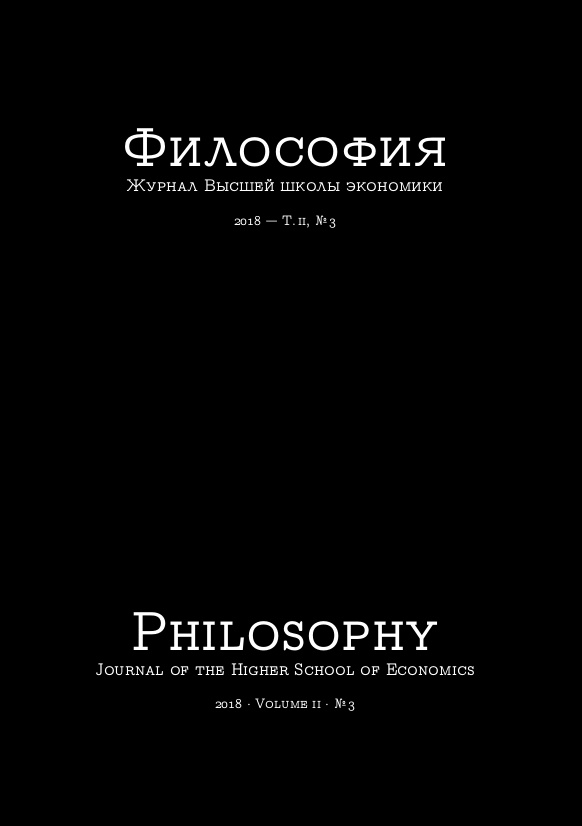 History of Political Languages: New Perspectives
Vol 2 No 3 (2018)
History of Political Languages: New Perspectives
Vol 2 No 3 (2018)Western history of political ideas and languages includes several schools, gradually emerging within the national communities during the second half of 20th century: Michael Foucault’s discourse analysis, Reinhart Koselleck’s Begriffsgeschichte, and Quentin Skinner and John Pocock’s Cambridge school Q. Skinner and J. A. G. Pocock. By the end of the century the influence of historical studies alongside with the maturity of methodological reflection of all the three approaches created conditions for a more global academic dialogue — European and transatlantic. Russian history of political languages is even younger: it was forming during the last 30 years, while being influenced by aforementioned schools, and it is now actively looking for a more adequate scientific language of its own. In the present issue reader may find original research on the Russian and European history of ideas, as well as theoretical articles, written in a dialogue between several approaches.
Natural multidisciplinarity of the history of political languages makes it an academic field shared by historians, philologists, philosophers, lawyers, political philosophers and specialists in political science. This water truce is not due to a natural disaster or institutional violence: it is a result of a genuine interest of the representatives of humanities and social sciences to the same body of texts. However, same sources do not mean same methods. Rather, we can identify several common themes and moves which fit contemporary history of political concepts and languages into a much older tradition of humanities.
Attractiveness and relevance of the history of ideas is due to the nature of a certain type of discursive political communication — the one mediated through a web of interlinked philosophical and polemical texts, politicians’ decisions and adopted laws. Political communities allowing certain liberty of discussion on matters of government were typically drawn into conflictual debates on urgent issues and into an even more sophisticated discussion of the second order (not in Pocock’s sense). We are talking about metadiscussion, e.g. discussion of the principles and norms which can be legitimately referred to in the political debate on specific issues of the current political agenda. In this respect history of political languages points out the fundamental role of living written tradition (and its studies) as a long term factor, which significantly determines character and outcome of political debates.
A canon of widely recognized political texts is changing, but some classical treatises and the very principle of having a canon of great books, great authors and great texts remains. These texts are being reinterpreted by every new generation of politicians, lawyers, historians and philosophers. Historians tend to reconstruct tradition either as a continuous evolution (England) or as a sequence of discourses formed by two (Germany) or even several (France) radically different epochs. In both cases tradition is not seen as steady: it is changing and evolving under pressure of external and internal factors, speech-acts of the influential authors or interest-groups, social and epistemic shifts.
The consequence of these changes are shifts in the meanings of key idioms and concepts. However, the majority of historical actors ignore the scale and pace of semantic change and keep on addressing the well established old body of texts as a familiar source of legitimate arguments, norms and models. The three leading approaches to the history of political discourse see these linguistic ruptures as a central issue. Historical consciousness formed by the experience and language is another major topic for the history of ideas.
Changes, translations, blending, reconstruction and obliteration of the meanings of the allegedly familiar concepts in texts of the past and present are raison d’être for the history of political languages. Historian’s efforts to reconstruct forgotten meanings and contexts aim at gauging and filling the gap between languages of the present and languages of the past. When he succeeds, historian can revitalize the language of the long forgotten canon and make its repertoire available for a wider public. After that political philosopher, lawyer or politician can in his own way use this old/new language in the current configuration where power and institutions are contested. Historian, at the same time, highlights the limitations of our modern political vocabulary: the hidden from users acts of normative coding, neutralizing and decoding each of the key concepts. In so far as political and social institutions are indeed backed up by public arguments, principles of political philosophy, and written laws, and not only by unreflected practices and organized violence, critical work on the history of political language remains acute and relevant.
Vladimir Korshakov’s article helps us to see that a well-established opposition between the concepts of svoboda (freedom) and volya (will) in the present-day Russian political vocabulary had no roots in the Old Rus’. Moreover, volya was far more important legal and political term, referring to one’s autonomy and ability to act on his own. Maria Ponomareva reconstructs the context and meaning of the concept respublica in the medieval French political debates. The main object of her study are versions and translations from Latin into Middle French of the Dispute between a Priest and a Knight treatise. César Ruiz Sanjuán addresses liberal tradition, offering a new reading of John Mill’s arguments in his classical essay On Liberty, identifying strong arguments in favor of the positive liberty against Berlin’s famous stance. Andrey Teslya considers Reflections on the question of nationality by Sergey Bulgakov in the context of the debate between Russian liberals, conservatives and socialists in 1909–1910. In the final article of research section Timur Atnashev and Michail Velizhev describe methodology which can be a basis for a new Russian history of political languages.
Translations section opens with a classical article by John Pocock: Burke and the Ancient Constitution. Historian of political languages shows how legal thought and precedent-based law in England of early Modern period formed one of the most influential political philosophies of this country — traditionalist philosophy, which did not refer to Ancient Greek and Roman heritage. In the second article a well-known historian Claudio Sergio Ingerflom invites to consider the possibility to go beyond the dichotomy of rupture and continuity as natural categories to analyze the meaning of the Russian Revolution. The third text in this section is a translation from Latin of the treatise De modem et diverso written by Adelard of Bath in 11th century. Its translator and commentator Roman Shmarakov emphasizes optimism, erudition and wit with which ancient tradition asserted itself in the High Middle Ages, repeating the same thing in a way as to make the message clear for the audience. The closing text of this issue illustrates this point as well. In his engaging postmethaphisical review of the Russian translation of Dylan Trigg’s book The Thing: A Phenomenology of Horror Denis Shalagin uncovers the possibility to give voice and to hear the horror produced by the awareness of the alien primordial flesh — as it can (not) be experienced before the separation in (my, ours, subjective) human and (objective, bodily) natural worlds.
Timur Atnashev, Mikhail Velizhev
-
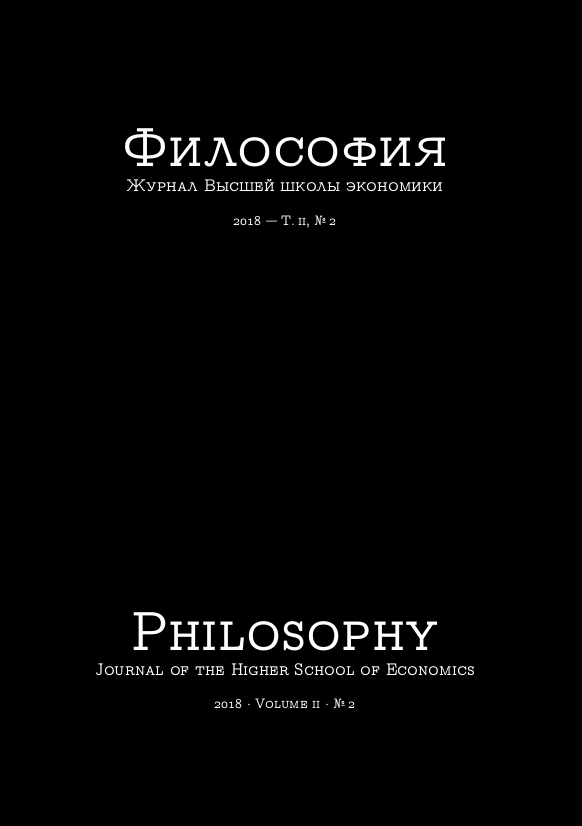 Before and After Revolution
Vol 2 No 2 (2018)
Before and After Revolution
Vol 2 No 2 (2018)The concept of revolution has undergone dramatic changes throughout the last two centuries — the same can be said about quite a significant number of concepts related to the revolution. The history of Russian thought in this regard is no exception, but in general the European history of this complex of concepts has been studied thoroughly, while in relation to the domestic materials we are yet at the first stage where the research is more about case studies and collecting primary material, and the large-scale generalizations, however necessary they may seem, could be rather speculative; it would be more correct to view such generalizations as a part of a research process, not as a closing address.
The agenda of this volume continues the issues raised a year ago in Vol. 2 (2017), where the concepts of action and reaction were in the focus of attention. Present issue focuses on the concepts of revolution and reform. The issue starts with an article by Andrey Ilyin, where he considers the relationship between the concepts of revolution and reform in the first years of Alexander II’s reign. Alexander Kotov's uses another perspective in his paper: he analyzes the main approaches to and methods of criticizing left radicalism by the publicists of the Katkov’s circle.
Kirill Solovyov's article is concerned with the perception of the idea of autocracy (samoderzhaviye) by the intellectuals and highest bureaucrats of the Russian Empire from the end of nineteenth to the beginning of the twentieth century: a few years before autocracy would become a subject of an intense public discussion due to the Fundamental Laws revision. Lubov Bibikova analyzes the use of the concept revolution by the various political police structures of the Russian Empire at the same time period; Giovanni Savino examines the influences and interrelation between the ideas of Antonio Labriola and Antonio Gramsci in the Russian Marxist movement.
The publications section contains a translation of the Friedrich Gottlob Bourne’s letters to Immanuel Kant (translation and introduction by Anna Vinkelman) and the first publication of Ludwig Binswanger's letters to Tatyana Sergeevna Frank (translation and introduction by Alexander Tsygankov and Teresa Obolevich). The publication of Binswanger’s letters to S. L. Frank’s widow not only provides plenty of information on the matters of place and time but also sheds some light on the history of Franck’s texts publications, mainly the German text of The Incomprehensible.
Next section opens with the reviews of the new books on the history of Russian thought (Andrey Teslya and Alexander Marey), which are followed by the reviews of Alan Kirby’s Digimodernism (Alexander Pavlov) and of a recent Russian version of In the Dust of this Planet by Eugene Tucker (Sofia Porfiryeva) and Yury Shichalin’s response to D. Bugay’s article On a new edition of Plato’s "Parmenides" (Questions of Philosophy, 2018, Vol. 3). Scientific life chronicle section contains a summary of The Idea of the Law in the Intellectual History international conference (which took place at the end of this April in St. Petersburg HSE campus) by Pavel Yushin.
Andrey Teslya, Publishing Editor
-
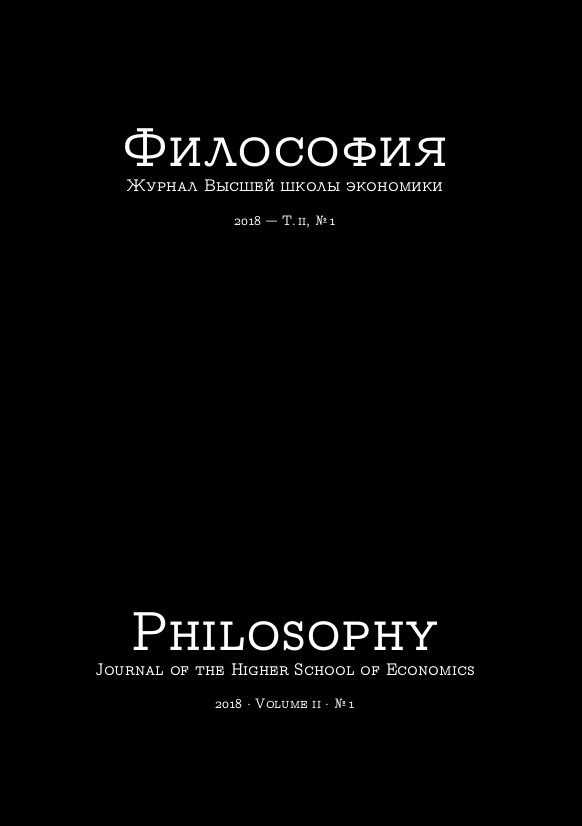 Philosophy and the Sacred in Antiquity
Vol 2 No 1 (2018)
Philosophy and the Sacred in Antiquity
Vol 2 No 1 (2018)The difference between philosophical and religious discourses is not reducible to the difference between the "rational" and the "irrational". Philosophers (at least, ancient philosophers) reflect on things divine either arguing with traditional views on what is fitting for god, or re-interpreting them by means of complex hermeneutic procedures. On the other hand, religion ( in this issue, we shall deal primarily with early Christianity) naturally embraces philosophy not only as a specific set of theoretical propositions or methods, but also as a way of life oriented towards the true and aimed at the assimilation with God. That is why the problem raised in this issue can only be approach in an interdisciplinary way: both the notion of the "divine" and the notion of the "philosophical" determine, to a greater or lesser extent, scientific, poetic, theological discourses.
The article of Irina Makarova deals with the well-known Aristotelian analogy between nous poietikos (active intellect) and light. Although Alexander of Aphrodisias identified active intellect with the divine intellect from the Metaphysics XII, this identification was questioned already in antiquity, for instance, by Themistius. Makarova's sharp analysis of the light-analogy brings her to the conclusion that active intellect in Aristotle has an "illuminative" function, as was noted by such Aristotle's commentators as Thomas Aquinas and Francisco Suárez.
Irina Prolygina explores the relationship between the rational and the sacred in the ancient medicine, namely, in the Galenic Corpus. Galen's method of medicine, based on empirical observation and logical reasoning, being opposed to various magical practices, was nevertheless compatible with the so called "temple medicine" and with the cult of Asclepius. According to Galen, "piety" and rational medicine are not mutually exclusive, insofar as physicians do not expect from Asclepius (as the "disciples of Moses" do from their God) to break the natural order of things.
Dmitry Biryukov's paper is dedicated to the philosophical notion of «participation» and its reception in the theology of Origen. Origen's teaching on participation goes back to Platonism, but it is also influenced by the Second Epistle of Peter. The author singles out two «discourses of participation» in Origen: natural participation and individual participation. It is the latter notion which is crucial for understanding Origen's idea of the «union with God».
Tatyana Aleksandrova provides a rich account of the Homeric Cento of the 1st redaction, which has been attributed to Eudocia the Empress, wife of Theodosius II. On the narrative level, the Cento represents a paraphrase of Gospels stories about Jesus. At the same time, on the «intertextual level», the text reworks certain "themes from the Odyssey" in a philosophical or even "mystagogical" way. In this respect, the author of the Cento must have been influenced by Porphyry ("On the Cave of Nymphs") and other Neoplatonists, who believed that Homer was initiated into the mysteries of the Universe.
In this volume, we also present two new Russian translations from the Church Fathers. St. Augustine's Homily In Psalm 136 was translated by Polina Semenova (editor: Sergej Stepantsov); St. Basil's Homily On Anger was translated by Anna Grünert (editor: Olga Alieva).
As usual, we present several book-reviews on various topics.
Olga Alieva, executive editor of the issue
-
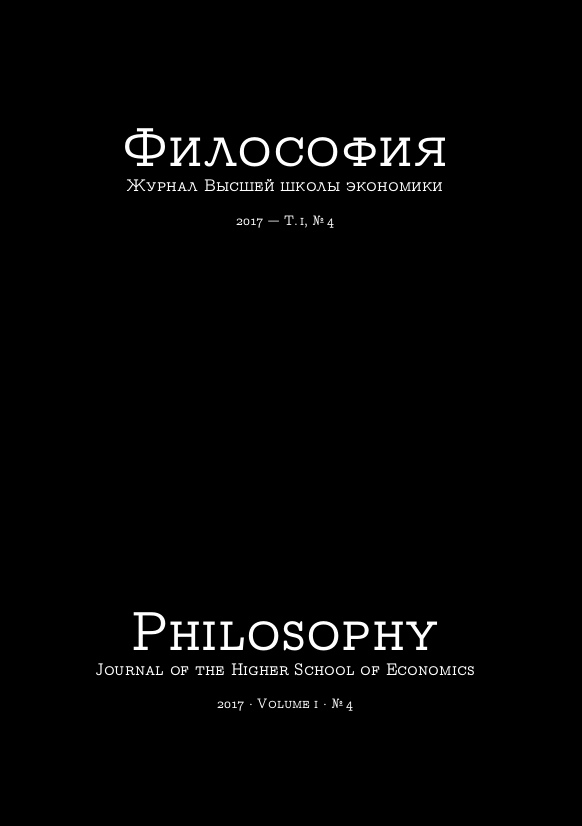 Foundation and Paradoxes
Vol 1 No 4 (2017)This issue deals with the problems of contemporary theoretical philosophy, mainly analytical. The title "Foundations and Paradoxes" refers to the dual task of any philosophical theorizing, which includes (a) the search for the ultimate foundations of being and cognition and (b) the opening up of paradoxes hidden in their depths. The issue contains investigations substantially associated with overcoming of some simplified metaphysical models and turning in the direction of action-based, dynamic, pragmatic approaches. We hope that articles by P. Valore, E. Borisov, S. Kuskova, E. Loginov, and K. Mikhailov will be of great interest for all who are concerned with issues of logic, ontology and philosophy of mind, whereas the translations of pioneering works by R. Kane and H. Frankfurt can give a reader a worthwhile introduction into the puzzles of free will and agent-based theory of action.
Foundation and Paradoxes
Vol 1 No 4 (2017)This issue deals with the problems of contemporary theoretical philosophy, mainly analytical. The title "Foundations and Paradoxes" refers to the dual task of any philosophical theorizing, which includes (a) the search for the ultimate foundations of being and cognition and (b) the opening up of paradoxes hidden in their depths. The issue contains investigations substantially associated with overcoming of some simplified metaphysical models and turning in the direction of action-based, dynamic, pragmatic approaches. We hope that articles by P. Valore, E. Borisov, S. Kuskova, E. Loginov, and K. Mikhailov will be of great interest for all who are concerned with issues of logic, ontology and philosophy of mind, whereas the translations of pioneering works by R. Kane and H. Frankfurt can give a reader a worthwhile introduction into the puzzles of free will and agent-based theory of action. -
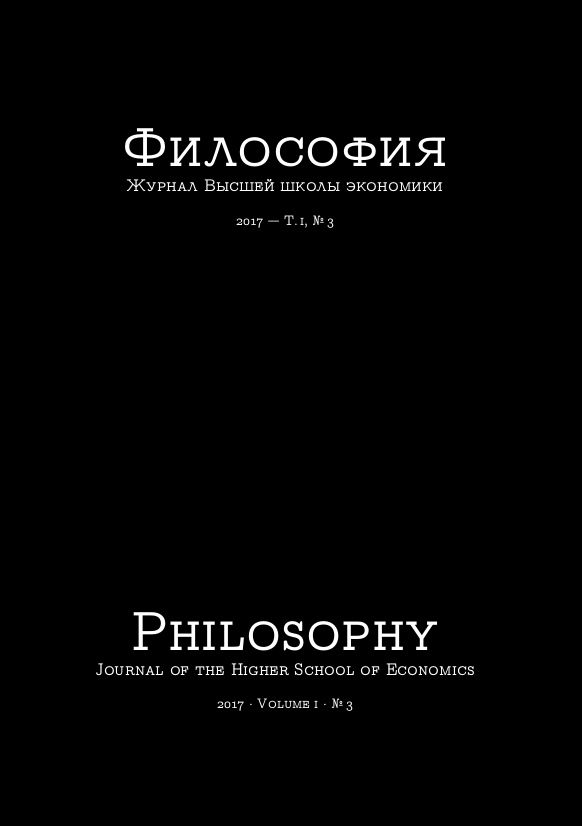 Models of Being and Frames of Knowledge
Vol 1 No 3 (2017)
Models of Being and Frames of Knowledge
Vol 1 No 3 (2017)The third issue of our Journal opens a new block of subjects and studies, this time regarding epistemology, ontology, and the philosophy of science. The range of materials may seem pretty colorful, but as the authors strongly believe, upon closer examination the reader will be able to see certain internal coherence and meaningful interchanges in these materials.
In particular, the block related to epistemological and ontological issues is of great interest.
The article of A. Shiyan deals with understanding of Husserl's phenomenology, which deviates from the main lines of interpretation of his philosophical system of views. Herewith the author refuses to divide Husserl's thoughts into periods (as it is normally done by researchers) and highlights the ontological and methodological principles of Husserl's phenomenological approach, which seem to be the most promising principles for today's philosophy. The author tries to minimize the text from the point of specific phenomenological terminology and to discuss the informative aspects of the philosophical language. Particular attention is paid to the topical issues of phenomenology and the possibilities for their different interpretations.
The article of T. Shiyan, which attempts to reveal the ontological status of mathematics and science objects, is rather innovative. The article refers to the fact that the meaning of the operation, consisting in the reference to the type of objects still has eluded logical and philosophical reflection and methodological theming. The author considers the years of controversy about the nature and genesis of philosophy, mathematics and science in general, and highlights four basic ontological interpretations of philosophy and science: as a knowledge, as a pool or system of knowledge, a type of certain activity and as a field of expertise or as a social institution.
In the same block we should also refer to the article of V. Kuznetsov, in which the famous ‘rule-following’ paradox formulated by Wittgenstein, receives interesting interpretations from the point of cultural context. For a productive and constructive discussion of the “rule-following” paradox in its various aspects, the author proposes to take advantage of the social relay concept offered by M. A. Rozov.
The article of A. Maltsev continues the study, first presented in the second issue, related to the problem of subjectness in Russia in the 18th century. Based on example of Andrei Bolotov the attempt to identify the possibility of crystallization of the human inner world, the formation of his sameness is made. It shows the way how through the internal mythology, a story about himself the core of “selfhood” is thought out and thus constituted as a creative act of invention and, in fact, self-creation. The reader is now offered to deal with the second part of this study.
No less curious is the block devoted to the subject of negativity. Here two papers are published. The article of A. Markov describes how the Greek philosophers of the scientific revolution era, bearing in mind the great heritage and striving to be competitive in the global marketplace of ideas, have radically changed both Platonism and Aristoteliasm. Although this philosophical project might be inspired by various sources, from apophatic theology to the second scholasticism, this study shows that it is completely self-sufficient and is fully based on the reinterpretation of logic and epistemology. The logic turns from the art of working with the idea into the characteristic of thought and the act of thinking is implemented as a negative epistemology.
The subject of negativity is continued by review made by D. Shalaginov, whose text analyses Andrew Culp's work called “Dark Deleuze”, which is the experience of the «negative» reading of the French philosopher's heritage. At present this «anti-connectivist manifesto» is one of the few attempts of radical revision of Deleuze thoughts. Definitely important act of Culp, focused on the gap with the so-called “canon of joy”, is faced with difficulties that have been highlighted in the review.
Another wonderful review, prepared by A. Tsygurov is made to the book “Kant's Modal Metaphysics” by Nicholas F. Stang, which introduces the reader to the fruits of many years of work, the results of which are impressive: in addition to the fact that the monograph is the first major study in English devoted entirely to Kant's modal metaphysics, it is accurate in the formulation of questions that need to be addressed to Kant's theoretical philosophy. This review will allow Russian-speaking readers interested in reconstructions of Kant's philosophy using modern philosophical tools, to familiarize themselves with both major themes of the book and the author's methodology.
The same section contains а review prepared by G. Korayev, which is dedicated to a nontrivial view of the creative heritage of M. Bakhtin. It is valuable not only from the point of return of a remarkable thinker to the native ground (through the revival of interest in his ideas), but also due to unexpected reversal in the presentation of possible views on his work in the modern humanitaristics in general, and study of Bakhtin thoughts in particular.
A special place in the issue belongs to the translation of Francisco de Vitoria, prepared by S. Porfiriyeva. From it we learn primarily about the magical competence of demons in representation of the right honourable medieval theologians, but also we can learn from this work, information about the state of scientific and magical knowledge of the historical era.
We sincerely hope that reading of this issue will be exciting and fun and the reader can find something useful.
Diana Gasparyan
-
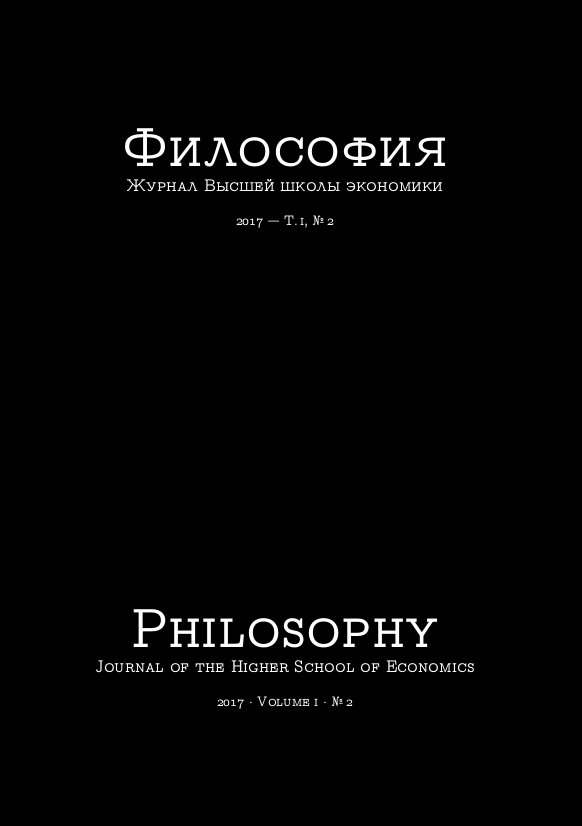 Action and Reaction
Vol 1 No 2 (2017)
Action and Reaction
Vol 1 No 2 (2017)The second issue of our Journal continues to examine the key issues of political and social philosophy. The topic of this issue contains a direct reference to the work of Jean Starobinski Action and Reaction. The Adventure of One Couple (Action et réaction. Vie et aventures d'un couple, 1999, Russian edition in 2008): in the variety of specific topics of the issue's materials, the dynamics of these concepts are clearly revealed, which, no doubt, can be considered one of the key ones for political philosophy during the 18-20 centuries. Articles by Jose-Luis Villacanhas Berlangi (Complutense University, Madrid), Vadim Chalii (Kant BFU, Kaliningrad), and Andrey Maltsev (independent researcher, Perm) analyze key aspects of modern political thought, from near-modernity to the reconstruction of contextual relations in the (self)description Andrey Bolotov.
In the discussion of the fundamental work, The Transformation of the World by Jürgen Osterhammel (English translation in 2014, original German edition in 2009), the possibilities of global history and its borders are explored — in this case, on the example of the 19 century; Tatiana Saburova (Indiana University, Bloomington; HSE, Moscow) and Andrey Teslya (BFU named after I. Kant, Kaliningrad; TOGU, Khabarovsk) participate in the discussion.
The historical and theoretical aspects of political philosophy in their unity are considered in the third Lecture on Political Law by Donoso Cortés (1836), which is presented in the translation by Yuri Vasilenko (HSE, Perm), who accompanied the publication with a detailed introductory article. The Preface of the translation editor Alexander Marey (HSE, Moscow) is devoted to the concepts of action and reaction in the philosophy of Donoso Cortés.
The next part is devoted to reviews. The review by Maria Marey (HSE, Moscow) on the collection of political texts by Alexander Herzen 1847-1869, the review by Maria Steinman (RSUH, Moscow) on the collective monograph Theology and Politics. Power, Church, and text in the Visigothic kingdoms (V - early VIII C.) and Alexander Pavlov's review (HSE, Moscow) on Disputes on Democracy by J.-V. Muller. Anna Winkelman, a student at the HSE (Moscow), offers us her thoughts on the book Sophie's Choice by U. Styron.
The final section of the journal contains a chronicle of the HSE's VIII International conference Ways of Thinking, Modes of Speaking, held in April 2017, as well as an information letter about the IX conference of the same name, which will traditionally be held in April of the upcoming year.
Andrey Teslya -
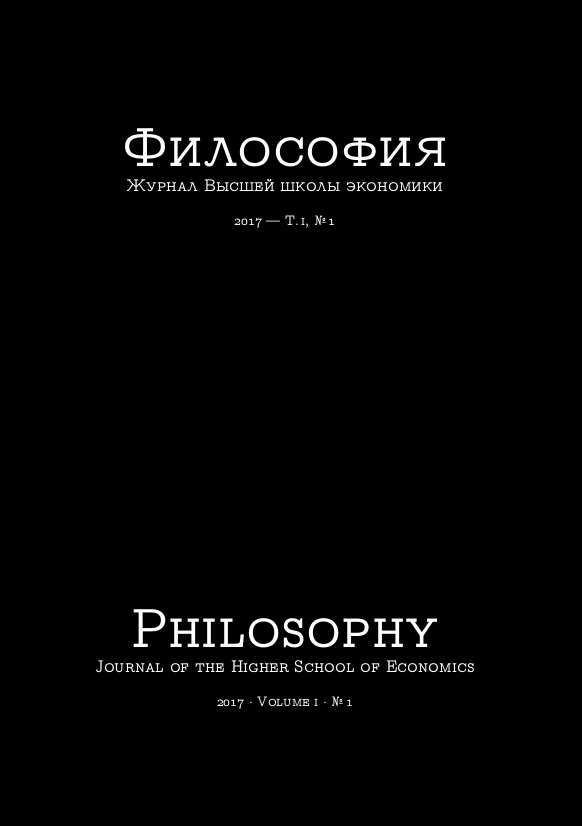 The State and the Revolution
Vol 1 No 1 (2017)
The State and the Revolution
Vol 1 No 1 (2017)The first number of our Review is dedicated to Political Philosophy. Almost all the authors centred their attention on the cluster of concepts such as the State, the Revolution, the Sovereignty, the Commonwealth either Republic as a particular type of the socio-political organisation. The theoretical and methodological approaches to the State interpretation became the principal point of D. Negro Pavon's article and, at the same time, for the fragment of Alessandro Passerin d'Entreves' book, translated into Russian for the first time. The same problems discuss in their book reviews Maria Marey and Greg Yudin. On the contrary, the articles by Richard Bourke, Gulnara Bayazitova and Andrey Teslya have more historical than theoretical orientation. The first author discusses the concepts of the old order and the Revolution; the G.Bayazitova's article stresses some points of the political theory of J.Bodin and Fr.Hautman, and Andrey Teslya emphasises the peculiarities of the socio-political thought of M.Dragomanov - Ukrainian thinker of the later XIX cent.
Previous
26-34 of 34
Keywords
Information

This work is licensed under a Creative Commons «Attribution-NonCommercial» 4.0 International




